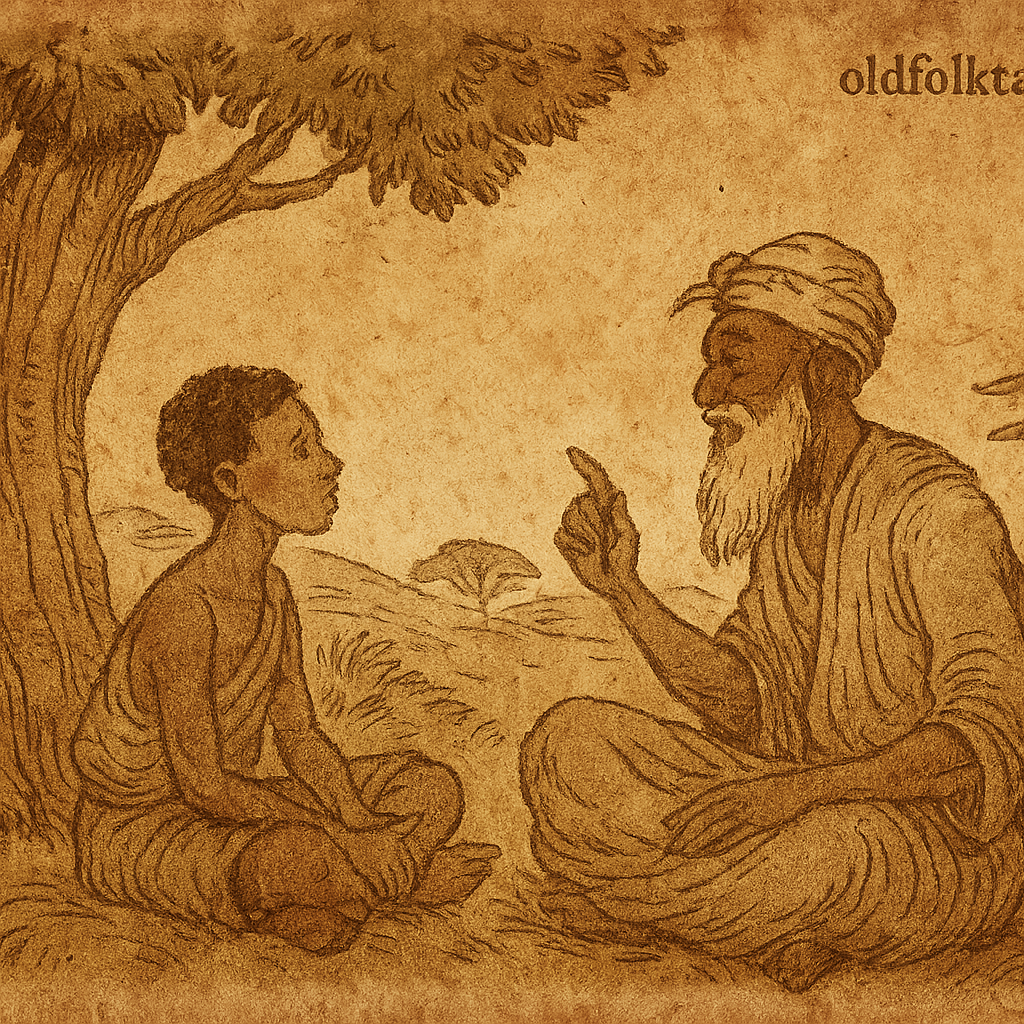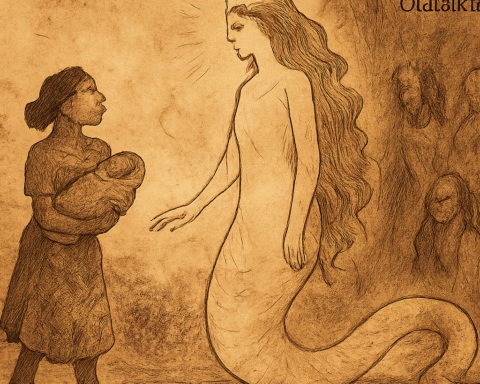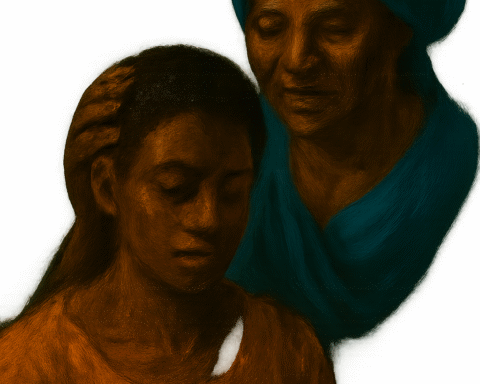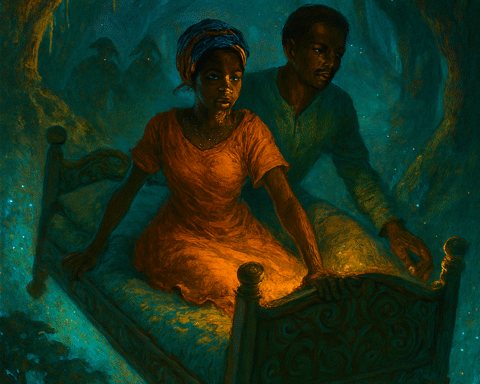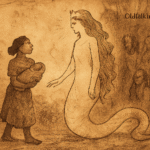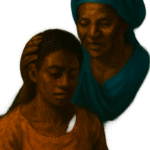Long ago in the ancient land of Tado, where the rivers wound like silver ribbons through verdant hills and the morning mist clung to towering palm trees, there lived a boy named Kokou whose story would echo through generations like the rhythm of ceremonial drums. His family dwelt in a modest compound where the red earth had been swept smooth and the walls were decorated with symbols that told the stories of their ancestors.
Kokou’s family was poor in material wealth but rich in the treasures that cannot be stolen or destroyed. They were keepers of old stories that stretched back to the beginning of time, guardians of songs that could call rain from reluctant clouds, and holders of wisdom that had been passed down through countless generations like precious heirlooms. His father’s voice could weave tales that made children forget their hunger, while his mother’s hands could craft medicines from forest herbs that healed both body and spirit.
Yet despite their noble calling as storytellers and wisdom keepers, the people of their village looked upon Kokou’s family with cold eyes and hardened hearts. Whispers followed them through the marketplace like persistent shadows, cruel words that cut deeper than any blade. The villagers claimed the family was cursed, that misfortune clung to their bloodline like thorns to cloth, and that their very presence brought bad luck to all who dwelt nearby.
Also read: The Foundling Hero
These bitter seeds of prejudice and fear grew in the dark soil of ignorance until they bloomed into something far more dangerous than mere dislike. Hatred began to spread through the village like wildfire through dry grass, consuming reason and compassion until only malice remained.
One dark night, when storm clouds masked the face of the moon and the wind howled through the palm fronds like the voices of restless spirits, this hatred finally boiled over into violence. A group of warriors, their hearts poisoned by years of whispered lies and manufactured fear, gathered in the shadows with weapons gleaming dully in their hands. They moved through the village like a pack of hyenas, their faces twisted with rage and their minds closed to mercy.
The warriors stormed Kokou’s family compound with the fury of a hurricane, their war cries piercing the night air like spears of sound. They showed no compassion for the innocent, no respect for the elderly, no protection for the young. In their blind rage, they cut down Kokou’s gentle father, whose only weapons had been words and wisdom. They murdered his mother, whose hands had healed more wounds than they had ever caused. They killed his sisters, whose laughter had once filled the compound like birdsong at dawn.
Only Kokou, still a small child with eyes that held more understanding than his years should have allowed, escaped this terrible massacre. An old hunter, whose heart had not been poisoned by the village’s hatred, witnessed the slaughter and felt pity stir in his chest like the first warm breeze of spring. With quick thinking and trembling hands, he hid the terrified boy under a pile of woven raffia mats, where Kokou lay still as death while the warriors searched for survivors.
When dawn finally broke over the devastated compound, painting the sky in shades of gold and crimson that seemed to mock the tragedy below, Kokou emerged from his hiding place like a small ghost wandering among the ruins of his former life. His family lay still and cold, their stories silenced forever, their songs cut short in the middle of their melodies.
The boy wandered through the morning like one lost in a nightmare, his feet carrying him away from the village that had shown his family such cruelty. Tears carved rivers down his dust-stained cheeks as he walked along the red earth road that led away from everything he had ever known.
Fortune, which had been so cruel to him in the darkness, showed him a different face in the daylight. A traveling merchant, his pack loaded with goods from distant markets and his eyes sharp from years of reading human nature, came upon the weeping child. The merchant’s weathered face softened with compassion as he looked down at Kokou, seeing in the boy’s tears an echo of every parent’s worst fear.
“Child, what has brought you to this lonely road?” the merchant asked, his voice gentle as rainfall on parched earth. “Where is your family?”
Through his sobs, Kokou told his story, the hatred of the villagers, the massacre in the night, the loss of everyone he had loved. The merchant listened with the patience of one who had heard many sorrows in his travels, and when the tale was finished, his decision came swift and sure.
“Come with me,” he said, extending his hand to the orphaned boy. “I have no son of my own, but from this day forward, you shall be mine. I will give you a home, a name, and a future brighter than the stars.”
Under the merchant’s protective roof, Kokou began to heal from his wounds, both visible and hidden. The merchant treated him not as a servant or a burden, but as a beloved son deserving of every opportunity. Kokou learned to carry goods to bustling markets where voices called in a dozen languages and spices perfumed the air with exotic scents. He mastered the intricate weights of cowrie shells, understanding the delicate balance of trade that connected distant kingdoms.
The boy absorbed the songs of traders like a dry riverbed drinks the first rain, learning melodies from lands he had never seen and stories of peoples he had never met. He sat at the feet of village elders, drinking in their wisdom like honeyed wine, storing their teachings in the vast library of his sharp mind.
Recognizing Kokou’s extraordinary intelligence, the merchant spent his own precious coins to provide the boy with books and scrolls, sending him to study with learned scribes who could unlock the mysteries of written words. Kokou’s hunger for knowledge was insatiable as a drought-stricken earth yearning for water.
His mind proved sharper than any warrior’s spear, cutting through complex problems with precision and grace. He studied the movements of stars across the night sky, mapping their ancient dances and learning to read the messages they wrote in light. He mastered the intricate laws that governed kingdoms, understanding how justice could be balanced like scales in a careful hand. He absorbed the histories of great kings and forgotten empires, seeing in their rises and falls the eternal patterns that shaped human destiny.
As the years passed and Kokou grew from boy to man, his reputation spread across the land of Togo like ripples from a stone cast into still water. People spoke of him as a man of extraordinary wisdom, a teacher whose words could guide even the most powerful chiefs, a counselor whose advice was sought by rulers from distant kingdoms. His name became synonymous with learning and insight, spoken with the same reverence once reserved for the greatest sages of old.
Yet despite his rise to prominence and respect, Kokou never forgot the lessons written in blood and tears upon his young heart. He honored the old hunter who had risked his life to hide a terrified child, ensuring the man lived his remaining years in comfort and dignity. He cared for the merchant who had shown compassion to an orphaned stranger, treating him with the love and respect due to a true father.
Most remarkably of all, Kokou found it in his heart to forgive even the village that had destroyed his family and cast him into exile. When people marveled at his capacity for forgiveness, he would smile with the wisdom of one who had learned life’s deepest truths through its harshest trials.
“Hatred may kill the body,” he would say, his voice carrying the authority of hard-won understanding, “but kindness raises the spirit higher than the treetops.”
And so, from the darkest soil of sorrow and injustice, Kokou’s legacy grew like a mighty baobab tree, its roots drawing strength from suffering transformed into wisdom. His name lived on through generations as a scholar whose understanding came not merely from books and scrolls, but from the profound lessons that only life itself can teach to those brave enough to learn from both its cruelties and its kindnesses.
Moral Lesson
This powerful Togolese folktale teaches us that our greatest tragedies can become the foundation of our greatest strengths. Kokou’s story demonstrates that while hatred and injustice may destroy what we hold dear, they cannot destroy our capacity to grow, learn, and ultimately transcend the circumstances that seek to define us. The tale shows that true wisdom comes not from avoiding suffering, but from transforming it into compassion and understanding that can benefit not only ourselves but entire communities.
Knowledge Check
Q1: What role does the old hunter play in Kokou’s survival and character development? A1: The hunter represents the spark of compassion that can exist even in the darkest circumstances. His decision to hide Kokou demonstrates that individual acts of kindness can change the course of history, and his example teaches Kokou the importance of showing mercy to others regardless of their circumstances.
Q2: How does the merchant’s adoption of Kokou reflect traditional African values about community and family? A2: The merchant’s willingness to adopt Kokou as his own son reflects the African cultural value of extended family and community responsibility for orphaned children. It demonstrates the belief that family bonds are created through love and commitment rather than only blood relations.
Q3: What symbolic significance does Kokou’s transformation from orphan to scholar hold in Togolese culture? A3: Kokou’s rise represents the African belief that knowledge and wisdom are the greatest forms of wealth, more valuable than material possessions. His transformation symbolizes how education and learning can lift individuals above the circumstances of their birth and benefit entire communities.
Q4: How does the village’s treatment of Kokou’s family reflect broader themes about prejudice and scapegoating? A4: The villagers’ persecution of Kokou’s family based on superstition and prejudice illustrates how fear and ignorance can lead communities to blame innocent people for their problems. This reflects universal themes about how societies sometimes turn against those who are different or misunderstood.
Q5: What does Kokou’s eventual forgiveness of his family’s murderers teach about the nature of wisdom and healing? A5: Kokou’s forgiveness demonstrates that true wisdom involves transcending the desire for revenge and choosing compassion over hatred. His ability to forgive shows that healing comes not from perpetuating cycles of violence, but from breaking them through understanding and mercy.
Q6: How does this Togolese folktale use education and learning as themes of empowerment and social transformation? A6: The story emphasizes that education is a powerful tool for overcoming adversity and transforming society. Kokou’s scholarly achievements show how knowledge can provide individuals with the means to rise above their circumstances and contribute positively to their communities, reflecting the high value placed on learning in West African cultures.
Source: Togolese folktale
